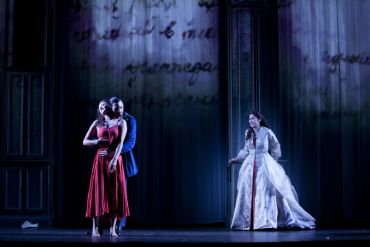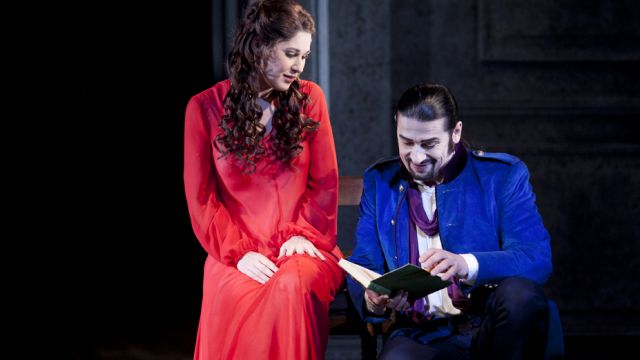Eugene Onegin
Eugene Onegin is Tchaikovsky’s and co-librettist Shilovsky’s adaptation of Alexander Pushkin’s novel in verse about love and rejection. It is, in turn, romantic and sad, and shows the powerlessness to avert impending tragedy once decisions have been made – and the music echoes these sentiments in themes and notes that rise and fall and rise again.
This 2013 co-production with the Royal Opera House, Covent Garden and Fondazione Teatro Regio, Turin was Danish director Kasper Holten’s first production after taking up the position as director of opera at Covent Garden. He first saw Eugene Onegin as a 13 year old and “fell in love with it completely”, even learning Russian to be able to read the original novel.
His intimate knowledge of the romantic themes of the story and the lyrical melancholy of Tchaikovsky’s music is manifest in his decision to approach the opera as a “memory … about two people who have to face the fact that they have grown up, and there are things you cannot go back and undo”.
 To this end he uses the overture to ‘flash’ forward to the final moment of the opera, where an older and wiser Onegin (Dalibor Jenis) and Tatyana (Nicole Car) look back and relive their story and thus realise that it is impossible to remake the past.
To this end he uses the overture to ‘flash’ forward to the final moment of the opera, where an older and wiser Onegin (Dalibor Jenis) and Tatyana (Nicole Car) look back and relive their story and thus realise that it is impossible to remake the past.
To re-create the image of the past, Holten uses two dancers to interpret their original meeting and take us back to the beginning of the opera, where, at harvest time, Tatyana reads and daydreams, her sister Olga (Sian Pendry) teases her about her romantic novels and Olga’s fiancé Lensky (James Egglestone) arrives with Onegin.
In various scenes the dancers are juxtaposed with the performers, reinforcing the ‘flashback’ nature of the production and adding extra vulnerability to moments of youthful emotion, painful rejection and hasty, fateful decisions.
Perhaps the most poignant of these is the famous Letter Scene, where the young Tatyana writes to Onegin telling him of her love. Using a simple change of costume, Holten transforms Tatyana to her older self, watching and singing as her younger self, portrayed in dance, agonises over the writing of the letter. This is a long aria, sung with beautiful emotion and poignant, ringing notes by Car as she watches with anguish her naïve younger self.
Another of these scenes shows the older Onegin watching his younger self approach with regret a duel with his friend Lensky, a duel that has resulted from his own insensitive, arrogant behaviour and will result in the death of his friend.
 To emphasise the episodic nature of the production – that is that each scene is a memory recalled – something is left on the stage after each scene. A letter, Tatyana’s discarded books, a sheaf of hay from the harvest, a broken chair, a cupboard door, a fallen branch in the snow where duel occurred, even Lensky’s fallen body, remain, symbolically, as do fragments of memory. This brings a greater depth to the production, one that was not necessarily ‘picked up’ by some in the audience! (“Why was a all that rubbish left on the stage?” was overheard from one patron as we left!)
To emphasise the episodic nature of the production – that is that each scene is a memory recalled – something is left on the stage after each scene. A letter, Tatyana’s discarded books, a sheaf of hay from the harvest, a broken chair, a cupboard door, a fallen branch in the snow where duel occurred, even Lensky’s fallen body, remain, symbolically, as do fragments of memory. This brings a greater depth to the production, one that was not necessarily ‘picked up’ by some in the audience! (“Why was a all that rubbish left on the stage?” was overheard from one patron as we left!)
As with Onegin, Tatanya’s costumes are also part of the ‘flashback’ technique. The dancer representing the Tatyana in memory wears red, as does Tatyana, but her older self adds an elegant white gown through which glimpses of the red dress beneath appear. There are few costumes changes and only Tatyana, Olga and Onegin’s costumes have vibrant colours. This in no way takes away from the production. In fact the duller, but lustrous fabrics used in the costumes of Tatyana’s mother (Dominica Matthews), the nurse (Jacqueline Dark), Lensky and the Chorus add to the idea of how things are remembered.
The grey, stylistic set hovers high above the performers, and opening doors allow for some vivid projections beyond – an autumn forest, fast falling snow, passages of a letter – that add dimension to the memories.
The orchestra conducted by Guillaume Tourniaire, the wonderful voices of all the principals and the chorus, and Holten’s unique interpretation of the story make this production of Tchaikovsky’s romantic, melancholic adaptation of Pushkin’s story truly memorable.
Carol Wimmer
Images: (top) Nicole Car as Tatyana & Dalibor Jenis as Onegin; (middle) Nicole Car as Tatyana & Konstantin Gorny as Gremin and (lower) Emily Ranford as Young Tatyana, Sam Colbey as Young Onegin & Nicole Car as Tatyana.
Photographer: Lisa Tomasetti.
Subscribe to our E-Newsletter, buy our latest print edition or find a Performing Arts book at Book Nook.

